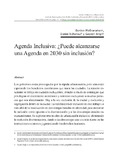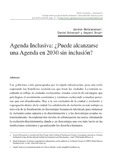| dc.contributor.author | McGranahan, Gordon | |
| dc.contributor.author | Schensul, Daniel | |
| dc.contributor.author | Singh, Gayatri | |
| dc.date.accessioned | 2017-03-22T14:47:36Z | |
| dc.date.available | 2017-03-22T14:47:36Z | |
| dc.date.issued | 2016-02-22 | |
| dc.identifier.citation | McGranahan, G., Schensul, D., and Singh, G. (2016.) Inclusive urbanisation: Can the 2030 Agenda be delivered without it? Environment and Urbanisation Vol 28, Issue 1, pp.13-34. | en |
| dc.identifier.uri | https://opendocs.ids.ac.uk/opendocs/handle/20.500.12413/12879 | |
| dc.description.abstract | Governments are wary of rapid urbanization, yet eager for the economic benefits that cities bring. The resulting tension is reflected in exclusionary cities created through strategies that privilege economic growth and result in many people being left behind. There is both exclusion from the city and exclusion and segregation in the city. This paper’s redefinition of inclusion moves beyond a focus on identity-based disadvantage, to frame inclusion as a counter to both overt discrimination and structurally created disadvantage. It explores three levels of inclusive urbanization: eliminating discriminatory exclusion, giving the disadvantaged a bigger voice in existing institutions, and guaranteeing human rights.
Drawing on examples of emerging economies, the paper points to the dangers of pursuing a growth-first strategy for urbanization, as exclusion can become entrenched and difficult to reverse, even with increased prosperity. It then examines how more inclusive urbanization can be achieved and how this relates to the Sustainable Development Goals (part of the 2030 Agenda). The world’s governments have committed themselves to balanced development that integrates economic, social and environmental goals, and have pledged that “no one will be left behind”. Inclusive urbanization is needed to achieve this balance, and to move the world towards the progressive realization of human rights for all. | en |
| dc.description.sponsorship | International Institute for Environment and Development | |
| dc.language.iso | en | en |
| dc.publisher | Environment and Urbanisation | en |
| dc.rights.uri | http://www.creativecommons.org/licenses/by/3.0/ | en |
| dc.title | Inclusive Urbanization: Can the 2030 Agenda be Delivered Without It? | en |
| dc.type | Article | en |
| dc.rights.holder | International Institute for Environment and Development (IIED) | en |
| dc.identifier.externaluri | http://journals.sagepub.com/doi/full/10.1177/0956247815627522 | en |
| dc.identifier.team | Cities | en |
| dc.identifier.doi | https://doi.org/10.1177/0956247815627522 | |
| rioxxterms.funder | Default funder | en |
| rioxxterms.identifier.project | Default project | en |
| rioxxterms.version | VoR | en |
| rioxxterms.versionofrecord | https://doi.org/10.1177/0956247815627522 | en |
| rioxxterms.funder.project | c941507f-fd0b-4fc3-9822-4b2132f61a1d | en |



